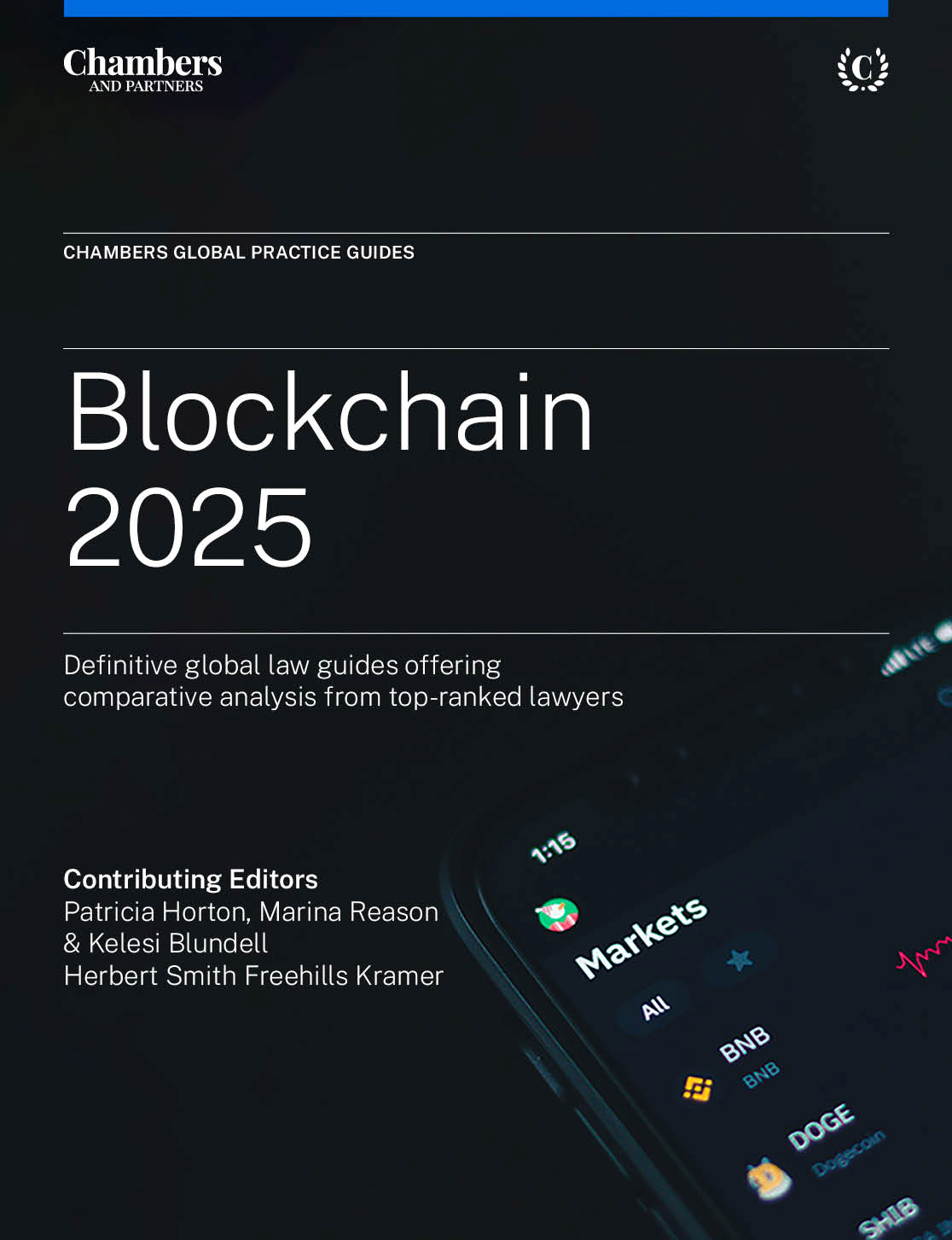
Blockchain 2025
The Blockchain 2025 guide features close to 30 jurisdictions. The guide provides the latest legal information on the evolution of the blockchain market, the status and use of digital assets, smart contracts, blockchain regulation, the tax regime for digital assets, sustainability and ESG issues, and data privacy and protection.
Last Updated: June 12, 2025
Compare law and practice by selecting locations and topic(s)
Select Locations

Select Topic(s)

Please select at least one location and one topic to use the compare functionality.
Global Crypto-Asset Regulation
The last year has seen increasing adoption of crypto-assets in mainstream finance. Some governments, including the United States, have given explicit backing to crypto-assets as an investible asset class.
Governments and regulators around the world have also been extending the scope of regulation to include crypto-assets, crypto-asset issuers and related service providers by further extending regulatory licensing, securities, fraud and anti-money laundering laws to them. For example, the EU’s Markets in Crypto-Assets Regulation (MiCAR) has imposed new regulatory licensing obligations on crypto-asset issuers (including issuers of stablecoins) and related service providers. Hong Kong has been expanding its virtual asset licensing regime, including in relation to stablecoins. The UK’s proposed extension of its regulatory framework to include crypto-asset intermediaries and stablecoin issuers will do similar things.
Regulatory innovation continues in relation to novel or developing crypto-asset business models. For instance, regulators around the world, including in Australia, are formulating frameworks for stablecoins, and their issuers, intended for use as payment methods. Regulators are also experimenting with crypto-asset-related business models – including in the UK, the Financial Conduct Authority’s “Digital Securities Sandbox”.
UK and EU
MiCAR fully entered into force at the end of 2024, introducing a bespoke, pan-EU regulatory regime for crypto-assets. MiCAR regulates those issuing and trading crypto-assets, as well as crypto-asset service providers across the EU and creates a crypto-asset market abuse regime.
The UK is creating a regulatory licensing regime for crypto-asset intermediaries, custodians and stablecoin issuers by amending its existing financial services regulatory framework. The regime will create the following new “regulated activities”:
- issuing qualifying stablecoin in the UK (offering, undertaking to redeem or maintaining the value of a qualifying stablecoin);
- safeguarding (custody of) qualifying crypto-assets or relevant specified investment crypto-assets, where “relevant specified investment crypto-asset” means a specified investment crypto-asset that is a security or a contractually based investment;
- operating a qualifying crypto-asset trading platform;
- dealing in (buying, selling, subscribing for or underwriting) qualifying crypto-assets as principal or as agent;
- arranging deals in qualifying crypto-assets; and
- making arrangements for qualifying crypto-asset staking, where “qualifying crypto-asset staking” means the use of a qualifying crypto-asset in blockchain validation.
Agreeing to carry on those regulated activities (except issuing qualifying stablecoins) will also be a regulated activity.
The territorial scope of the new regime will be relatively broad. A firm dealing directly or indirectly with a UK consumer when operating a qualifying crypto-asset trading platform, dealing in qualifying crypto-assets as principal or as agent and/or arranging deals in qualifying crypto-assets will need to obtain UK authorisation whether it is based in the UK or overseas, unless it is dealing through a relevant type of UK authorised crypto-asset intermediary.
A firm that is carrying on either the regulated activity of safeguarding qualifying crypto-assets or relevant specified crypto-assets, or the regulated activity of qualifying crypto-asset staking, whether in the UK or on behalf of a customer in the UK, will need to become authorised. Firms that safeguard qualifying crypto-assets at the direction of a person that is itself authorised to carry on that regulated activity are exempt from the authorisation requirement.
The changes will also broaden the UK “financial promotion” regime so that anyone marketing qualifying stablecoins and/or certain new controlled activities (eg, safeguarding of qualifying crypto-assets) will be subject to the statutory restriction on making a financial promotion unless the communication has either been made by an authorised person or approved by an authorised person, or the promotion is exempt.
The UK government will publish legislation for a crypto-asset market abuse and admissions and disclosures regimes “in due course”, but plans to legislate for the new crypto-asset regulatory regime by the end of 2025.
United States
In the United States, an updated version of the Responsible Financial Innovation Act (RFIA) was introduced in July 2023, aiming to provide greater clarity for establishing whether a cryptocurrency is a security or commodity. The RFIA did not, however, gain much traction in the US Congress and to date has not been enacted into law nor re-introduced in the current legislative session. In June 2023, the Financial Innovation and Technology for the 21st Century Act (FIT 21) was introduced, providing a framework for regulating digital assets, and aiming to fill regulatory gaps. In addition, FIT21 gives the Commodity Futures Trading Commission primary jurisdiction over digital asset markets. In May 2024, FIT 21 was passed by the US House of Representatives. The legislation was then referred to the US Senate’s Committee on Banking, Housing, and Urban Affairs, but did not receive further formal attention in the Senate before the close of session.
The Trump Administration has struck a supportive note for blockchain/cryptocurrency. In January 2025, for example, President Trump issued an Executive Order (“Strengthening American Leadership In Digital Financial Technology”) which per an accompanying White House release is designed to foster “regulatory clarity for digital financial technology and secure America’s position as the world’s leader in the digital asset economy”. The Executive Order established a Presidential Working Group on Digital Asset Markets, which is tasked with developing a federal regulatory framework “governing digital assets, including stablecoins, and evaluating the creation of a strategic national digital assets stockpile”, while prohibiting US agencies from establishing any central bank digital currencies. Thereafter, in March 2025, President Trump issued a further Executive Order (“Establishment Of The Strategic Bitcoin Reserve and United States Digital Asset Stockpile”), which establishes a US Strategic Bitcoin Reserve, capitalised with bitcoins seized in US legal proceedings. The US Treasury and Commerce Departments are also directed to develop “budget-neutral” strategies for acquiring additional bitcoin, provided they impose no incremental costs on US taxpayers.
In the current Congressional session (2025–2026), the “Boosting Innovation, Technology, and Competitiveness through Optimized Investment Nationwide Act of 2025,” or “BITCOIN Act of 2025,” was introduced in both the House and Senate in March 2025. Per the Bill’s sponsor, the BITCOIN Act “builds upon” and is intended to codify into law the key provisions of the March 2025 Executive Order. If enacted in its current form, the BITCOIN Act would among other provisions:
- direct the US Treasury Department to establish a “Strategic Bitcoin Reserve”, a decentralised network of secure bitcoin storage facilities distributed across the United States for the “cold storage” of government bitcoin holdings (and also establish a programme allowing a US state to voluntarily participate in storing state bitcoin holdings in the Strategic Bitcoin Reserve); and
- establish a “Bitcoin Purchase Program” to purchase 200,000 bitcoins per year over a five year period.
In addition, President Trump’s pick to head the SEC, Paul Atkins, was sworn into office in April 2025. Mr Atkins, whom various media reports have described as “crypto-friendly”, replaced former SEC head Gary Gensler, who had espoused a more aggressive approach to cryptocurrency regulation and had brought a host of enforcement actions against crypto firms.
Hong Kong
Over the past 12 months, Hong Kong has continued to improve access to and enhance the regulatory landscape for virtual assets (VAs), with the principles of investor protection, sustainable liquidity and adaptive regulation in mind.
In November 2024, Hong Kong Exchanges and Clearing Limited launched the HKEX Virtual Asset Index Series to provide investors with transparent and reliable benchmarks for bitcoin and ether pricing in the Asian time zone. It was the first EU Benchmarks Regulation-compliant VA index series developed in Hong Kong.
Since the implementation of the mandatory licensing regime for VA trading platform (VATP) operators on 1 June 2023 and the end of the non-contravention period on 1 June 2024, the Securities and Futures Commission (SFC) has introduced a swift licence approval process and provided further guidance to applicants, including sharing the findings of its inspections and setting out expected standards of conduct for VATPs. To support the development of sustainable business models, the SFC established a VA consultative panel in early 2025 that included representatives from each VATP licensee to ensure that their perspectives are taken into account in the SFC’s policymaking.
Most recently in April 2025, the SFC and the Hong Kong Monetary Authority (HKMA) issued circular guidance on the provision of staking services by licensed VATPs, authorised VA funds, and authorised institutions (ie, banks). This was in response to investor demand for staking services and the potential for staking activities to contribute to the security of the blockchain network.
Separately, the Hong Kong legislature is currently reviewing the Stablecoins Bill, a proposed new piece of legislation which sets out a regulatory regime for issuers of fiat-reference stablecoins, following a public consultation which ended in July 2024. The HKMA has launched a sandbox to facilitate the exchange of views with the industry on the proposed regulatory requirements.
In addition, the HKMA consulted the industry in early 2025 on the implementation of the prudential treatment of crypto-asset exposures held by authorised institutions, to align the requirements with the Basel Committee on Banking Supervision guidance, with the aim of implementing the requirements on 1 January 2026, consistent with the Basel timeframe.
Looking ahead, Hong Kong has a wide range of initiatives planned, including the 12 major initiatives announced by the SFC in February 2025 under a five-pillar “ASPIRe” roadmap, to:
- streamline market entry through regulatory clarity (“Access”);
- optimise compliance burdens without compromising security (“Safeguards”);
- expand product offerings and services based on investor categorisation (“Products”);
- modernise reporting, surveillance and cross-agency collaboration (“Infrastructure”); and
- empower investors and industry through education, engagement and transparency (“Relationships”).
Under the “Access” pillar, the Hong Kong government is adjusting its proposal in relation to a dedicated licensing framework for over-the-counter VA trading, to take into account outcomes of the public consultation conducted in 2024, and plans to conduct a second consultation in 2025. The government also plans to complete legislative preparations for a licensing regime for VA custodian services within 2025.
Australia
As in previous years, Australia has a significant focus on the digital asset sector. This has been elevated by 2024 data showing a sharp increase in crypto-funded scams perpetrated against Australian consumers as banking sector measures have made fiat-funded scams less successful. A new Scam Prevention Framework was passed into Australian law in early 2025, to identify, disrupt and prevent scams, but this will only come into force once sectors are designated. Although the crypto sector was not earmarked as one of the first designated sectors, it is likely to be given the waterbed effect. In the meantime, several Australian banks have introduced measures to prevent on-ramping to crypto by blocking fiat payments to crypto exchanges, with mixed reviews.
The government’s response on the appropriate legal and regulatory framework for the digital asset sector has been plagued by delays. The former government proposed a licensing regime after a comprehensive consultation, before the current government decided not to pursue the proposal, and a private member’s bill echoing the former government’s consultation was side-lined into Parliamentary Committees. The current government redid the consultation, starting with a token mapping consultation followed by a licensing consultation. The new licensing regime proposes to regulate entities custodying digital assets or entitlements in either a token-based or account-based system, which means those conducting traditional financial services in relation to that custody facility would also be regulated. Being regulated means that the full suite of traditional licence obligations would apply to the issuer, dealers, arrangers, advisers, etc, with some obligations tailored. Additionally, where a platform conducts certain other financialised functions (token trading, token staking, etc), additional obligations would apply to those activities and those activities would be restricted to licensed entities.
As part of a modernisation of Australia’s payment system, the government consulted on a new payments licensing framework which includes regulating stablecoins as “stored value facilities”, with oversight by Australia’s securities/conduct regulator (ASIC) and/or Australia’s prudential regulator (APRA). Draft legislation for both reforms was scheduled to be published in 2024, but was delayed first by the government’s ambitious reform agenda, and again in 2025 by a federal election. The current government has expressed commitment to introducing this licensing framework, but there is no set date for publishing either draft legislation.
ASIC continues to take action when it perceives that digital assets amount to traditional financial products. In ASIC v Block Earner, it had early success in relation to whether a staking program was a financial product, but the federal court overturned the decision. In response to market calls for clarity, ASIC issued a high-level information sheet (INFO 225), and in 2024 consulted on an unreleased update that will provide further detail and case scenarios. APRA was also expected to conduct a consultation on the prudential handling of crypto-assets by banks in 2024 aligned to the Basel standards, but this is now expected in 2025.
Finally, the crypto exchange sector has been regulated as part of Australia’s anti-money laundering framework since 2018. In November 2024, parliament passed amendments to the regime, which modernises the regulation of digital currency, and virtual asset and payments technology. Changes specifically impacting the digital assets sector will commence in March 2026.



